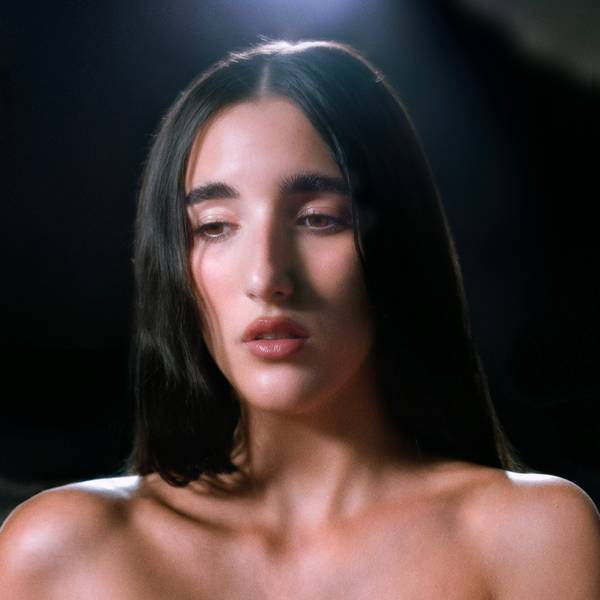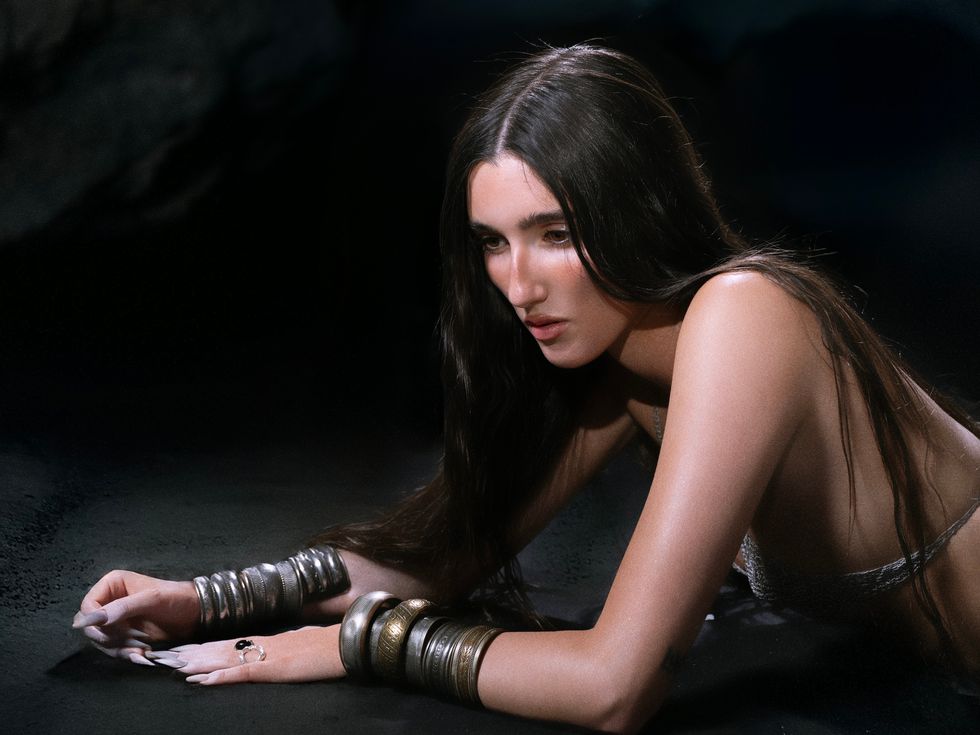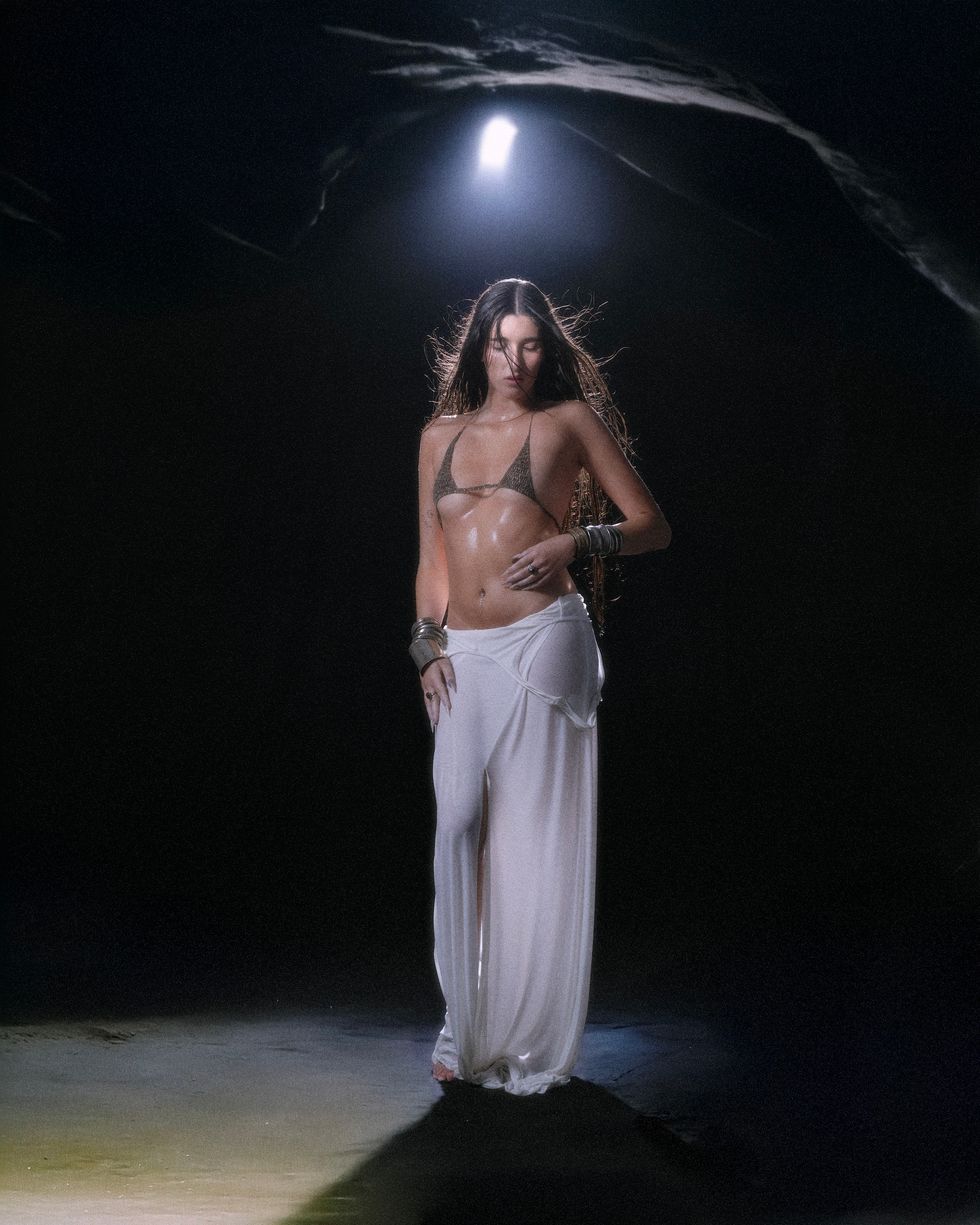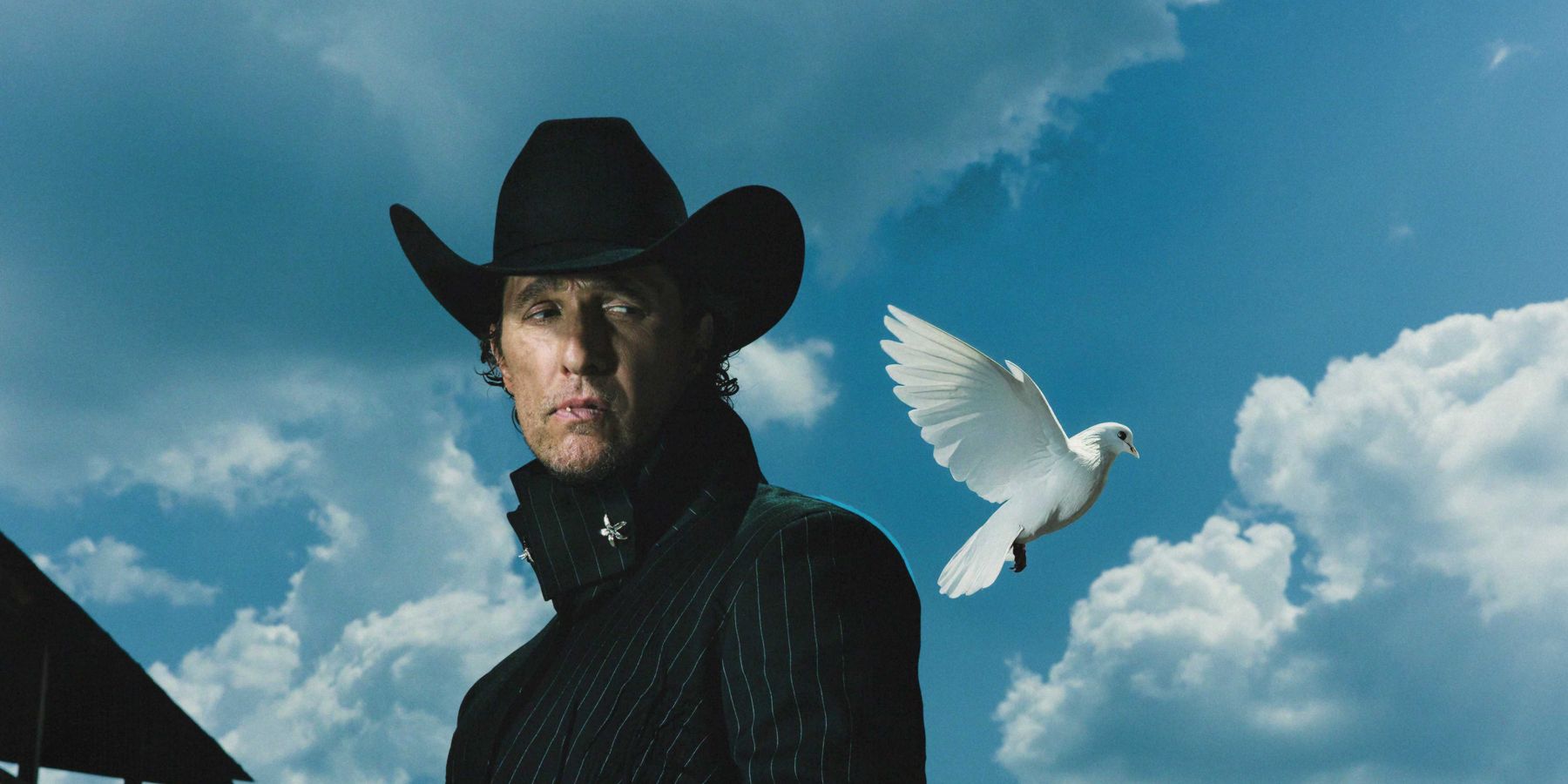
Judeline Reveals a New Pop Vision
By Beverly Bryan
Nov 26, 2024
Judeline logs on for our interview from the back of a cab as it winds through the streets of Madrid. It’s All Saints Day and she is en route to meet her mother for brunch. The 21-year-old Spanish pop artist listens through earbuds as she gazes, relaxed, into her phone. The contrast between her present nonchalance and the ethereal mystery of her debut album, Bodhiria, is a little startling.
“Ethereal” is a term that has been over-applied to music made by women, but this album is exactly that. The songs are sung from the point of view of a protagonist separated from her lover by death, or, possibly, something stranger. Languishing in metaphysical exile, she calls out to her love. Judeline sings in a clear, rippling voice filtered through curtains of autotune, somehow conveying both fragility and more duende than one human body should be able to carry.
Part of Bodhiria’s otherworldliness comes from its inherently liminal nature. It’s made up of spaces between things: the soul and the senses, digital and analog, Europe, Africa and the Middle East. Judeline and her collaborators, young Spanish producers including Tuiste, Mayo, Rusowsky, Ralphie Choo and DRUMMIE, don’t seem to recognize these boundaries. They drift across them, gliding through underground dance music, flamenco, Latin American folklore, hip-hop and R&B like restless spirits trying to communicate by twisting a radio dial. Beat-driven and grounded by plenty of low-end, these moody experiments coalesce into one solid collection of visionary pop. Listening to the album feels like getting passed a mixtape leaked from the future — though Spain and the rest of the world are quickly getting up to speed.
When Judeline speaks with PAPER, it's at the tail end of Bodhiria’s release week, which was heralded by an electronic billboard in Times Square, courtesy of Spotify. Her tracks stream in the millions on the platform. Two weeks later, the star performed a stripped-back Color Studios set, followed by the announcement that she'll be playing next year's Coachella. Below, PAPER chats with Judeline about the different boundary lines in her music, as well as some of the more material spaces between in her life, such as the gap between Los Caños de Meca, the small coastal village in southern Spain where she grew up, and her present burgeoning fame.
How has your week been?
It was intense. A lot of different feelings, but I'm very happy. I think people loved [the album]. Honestly, I feel like the reception has been very good. People in Spain are really loving it and the tour is almost sold out. Joe Jonas posted a photo with my song. That was crazy to me. How did he discover my album? He was my crush when I was little.
Have people started to recognize you in Madrid?
They do. That started to happen a little bit about a year and a half ago, when I dropped “Canijo.” In the street, in certain places where young people live, where students live, I will see this type of young person dressed in a certain way and I know they are going to ask for a photo or something. I call them Las Modernas. You know, queer, fashion, young — girls with an alternative look. I don’t know. I can say it in Spanish, which is Las Modernas.
What is the music scene like in Madrid?
A lot of cool things are happening now. Rusowsky, Ralphie Choo, me. There are a few people that are making this new sound, a new Spanish pop, a new alternative. We are kind of making a movement, not only in music, but in aesthetic things. There is a little circle. We all knew each other from the start and now we have grown up together and people are becoming fans of the whole movement. I met Ralphie Choo when I was 17, when I arrived here in Madrid.
Did you come to Madrid for college?
I needed to do the last two years of high school in Madrid. You can choose to study arts, science, or letters. I wanted to do arts and there was no way to do it in my village.
Did you stay with family?
No, I worked for a whole summer and I rented a room. I think it was 300 euros a month in a weird neighborhood. It was a full experience. Then I was very lucky to start working in music, and I was, like, “Okay, I’m quitting. I’m quitting my studies.” I finished secondary school, but I didn’t finish the last year that you need to go to university.
What was it like being in the city on your own as a teenager?
It was hard, honestly. I was becoming an adult and getting used to being in this new world and getting used to a lot of people. I am from a very small village, and I was used to knowing every single person that I saw on the street and being very close to everyone, and then I moved to Madrid. Everyone goes so fast. No one says hello to anyone. They don't say good morning in the stores. I felt like people were so rude to me.
I was going back home, and I was so sad, but also I was the weird kid in my village and everyone was staring at me a lot, and criticizing me sometimes because I dressed a certain way and my hair was purple. When I moved to the city, I was so free. I could do whatever I wanted. I could dress however I want. Nobody cared what I was doing and that was so good to me. It really helped me to feel more secure and discover who I wanted to be.
Were you already writing songs before that, in your hometown?
I was, but I didn’t have anyone to make music with me. I used to grab beats from YouTube. I would type in “XXXTentacion type beat.” I used to release music on Soundcloud, because I didn’t have money to pay for the beats. Then, during quarantine, this producer, Alizzz, who worked with C. Tangana and other Spanish artists did a contest. He was releasing beats and you could do your song on a beat. The best one would win and he would release that. So, I won the contest and I met people on social media who were producers in Madrid. So, that's why, when I moved to Madrid, I had the chance to meet and connect with a lot of people that were doing music.

How did you connect with the people you work with now?
During quarantine, I started talking to Tuiste and we became internet friends. He was living in a city near mine. He’s Andalusian too. That September, both of us moved to Madrid at the same time. He moved into a house with Mayo, the other producer that I work with. I was always going to that house and making music with them. I almost lived in that house. We were always together there, smoking joints, watching movies and making music. It was a very crazy year for us. We had literally no money. We didn’t go out.
The mix of sounds on the album is really interesting. There's hip-hop and R&B and underground electronic music and avant-garde pop and flamenco and Latin American folkloric music and Arabic influences. Am I missing anything? How did that come about?
When they ask me if I have a genre, or what kind of music I make, I don’t know what to say. I really like to mix different vibes on different songs, but I don’t do it on purpose. It comes pretty organically. We just flow with the creative process. We don’t look for it, but it ends up like that. Andalusian people have a lot of mixed roots and a mix of cultures, and then we have the influence of what is happening in the US or what’s happening in France.
What kind of music did you like growing up?
I listened to what my parents were listening to, honestly. My dad was a huge fan of The Beatles and bossa nova. He liked The Doors. He had a lot of Talking Heads. My mom loved flamenco. She loved The Police. They had similar taste. There was a lot of flamenco and also traditional Venezuelan music in my house growing up.
Right, your father is originally from Venezuela. I read that you learned to play the cuatro from him growing up and that “JOROPO” on the album is a Venezuelan-style song.
Yeah. I did that song with my dad. It was very cute to bring him into the studio and share time with him. He was so emotional because he didn’t have much of a chance to go to the studio and express his talent. It was really cool.

Did he encourage you to do music?
I don’t know what I would do without him. He taught me to write songs. So, he really inspired me. He didn’t sit with me and say, “Hey, you need to do this, this, and this.” I just watched how he did things. I think he really influenced me in the creative process. He was really creative. Of course, when I started making music, he told me to be careful and people in the industry are only looking for money, but I was in this teenage moment and I didn’t want to hear that.
There's a lot of material on Bodhiria, and in the music videos for it, where you're exploring both spirituality and sensuality, and you mix mysticism into these love songs. How did those themes emerge on the album?
I'm very curious about spiritual experiences or different religions — how each person feels faith or connects with the spiritual part of themselves, and I love to bring that to my music. My village had this huge hippie movement when I was growing up. In the ’90s, a lot of hippie people went there to live and now there is like this spiritual culture in our village. Everyone meditates. Everyone feels connected to nature. So, that was my education, too. And then Andalusia is a very religious place. Catholicism is very important. We have our Holy Week, like Semana Santa, the Easter. And it's very, very strong and important in Andalucia. People cry and go crazy for the saints that get carried in the street. That really moves something in me.
How does that connect to the romantic parts of Bodhiria?
Bodhiria tells the story of this girl who is stuck in this limbo, this no place, and she can only have a connection with the guy she loves and god. So, that’s why the religious part and love are the two important things on the album.
Is this girl the same as the figure credited on the album as Angel A? Is this character like a part of you, or is it more like you are telling her story?
I’m telling her story, but also I have a lot of things in common with her. I didn’t want to say it in my words. It was easier for me to put it in someone else’s words.
Photography: JP Bonino
Related Articles Around the Web
MORE ON PAPER
ICONOS: Pepe Aguilar, El Oficio del Tiempo, la Voz del Silencio y el Peso del Legado
Español
Jan 19, 2026
Entertainment
Cynthia Erivo in Full Bloom
Photography by David LaChapelle / Story by Joan Summers / Styling by Jason Bolden / Makeup by Joanna Simkim / Nails by Shea Osei
Photography by David LaChapelle / Story by Joan Summers / Styling by Jason Bolden / Makeup by Joanna Simkim / Nails by Shea Osei
01 December
Entertainment
Rami Malek Is Certifiably Unserious
Story by Joan Summers / Photography by Adam Powell
Story by Joan Summers / Photography by Adam Powell
14 November
Music
Janelle Monáe, HalloQueen
Story by Ivan Guzman / Photography by Pol Kurucz/ Styling by Alexandra Mandelkorn/ Hair by Nikki Nelms/ Makeup by Sasha Glasser/ Nails by Juan Alvear/ Set design by Krystall Schott
Story by Ivan Guzman / Photography by Pol Kurucz/ Styling by Alexandra Mandelkorn/ Hair by Nikki Nelms/ Makeup by Sasha Glasser/ Nails by Juan Alvear/ Set design by Krystall Schott
27 October
Music
You Don’t Move Cardi B
Story by Erica Campbell / Photography by Jora Frantzis / Styling by Kollin Carter/ Hair by Tokyo Stylez/ Makeup by Erika LaPearl/ Nails by Coca Nguyen/ Set design by Allegra Peyton
Story by Erica Campbell / Photography by Jora Frantzis / Styling by Kollin Carter/ Hair by Tokyo Stylez/ Makeup by Erika LaPearl/ Nails by Coca Nguyen/ Set design by Allegra Peyton
14 October
Entertainment
Matthew McConaughey Found His Rhythm
Story by Joan Summers / Photography by Greg Swales / Styling by Angelina Cantu / Grooming by Kara Yoshimoto Bua
Story by Joan Summers / Photography by Greg Swales / Styling by Angelina Cantu / Grooming by Kara Yoshimoto Bua
30 September




